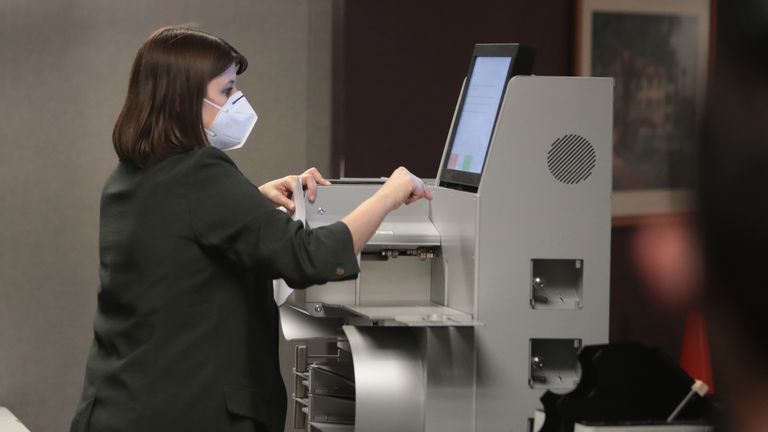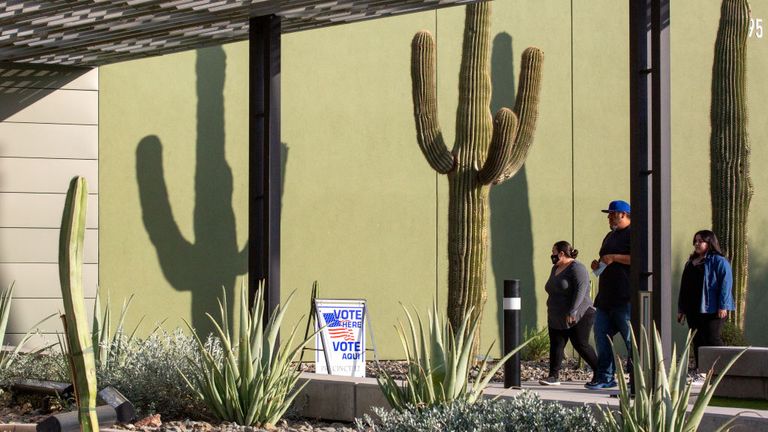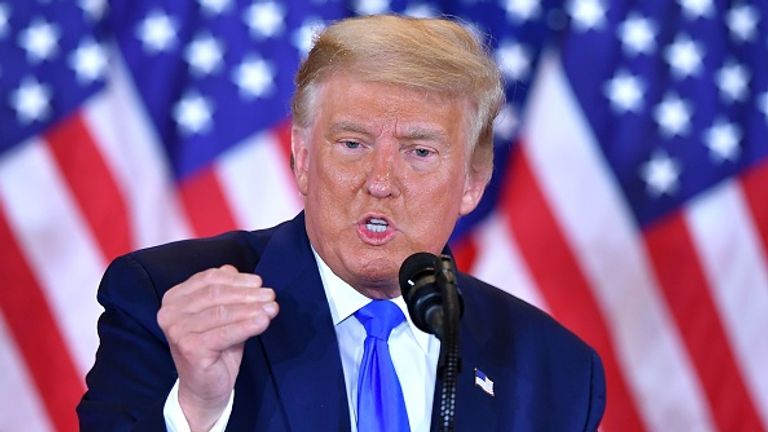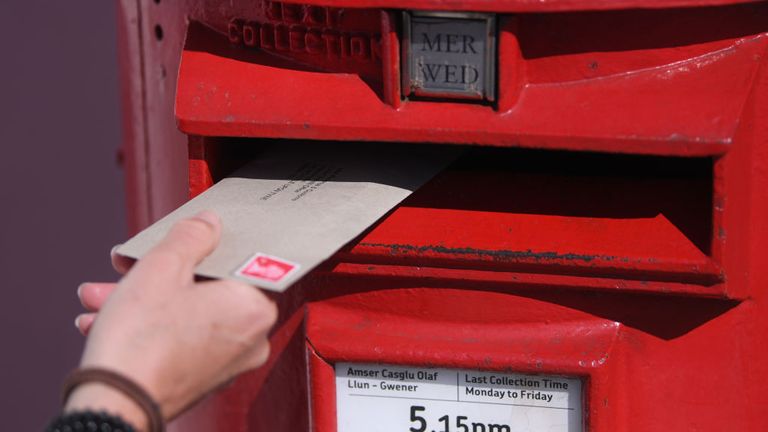Polling experts and election boffins tell us they never expected a winner to be announced on the night.
But people across the world are now starting to wonder why – almost two day after polls closed – we still don’t know who will be the president of the United States.
In a speech in the initial early hours of counting, Donald Trump declared himself the winner of the US election – but his challenger Joe Biden preferred to tell his supporters: “patience, patience, patience”.
And now it seems like patience will be the key.
Here’s why there’s been a delay:
Postal votes are largely to blame. As is the US system of allowing states to make all their own (and often differing) rules on anything, but in this case specifically, also on vote counting.
This means that each state sets a different timeline and deadline for when they should be tallied.
Rules in some states don’t allow election workers to begin the labour-intensive work of processing postal (or “mail-in ballots” as they are known in the US) until election day itself.
The deadline for postal votes in North Carolina is 10 November, Alaska is 12 November, and in Washington state, it stretches to 23 November.
Washington and Alaska are relatively unimportant for the final result in the presidential race, in that Washington is strongly Democrat and Alaska is fairly solidly Republican, but it nevertheless means a full vote count will not be available for many days to come.
Postal votes typically take longer to count then those made at a polling station, as they have to go through a longer process of steps to ensure they are not fraudulent.
Of course, this year, there have been record numbers of them – more than 99 million – due to the coronavirus pandemic. And because of that, dozens of states have modified their rules for mail-in voting – some of those changes being more substantial than others.
California, Nevada, New Jersey and Vermont, along with Washington DC for instance, sent mail-in ballots to all voters, joining the handful of states that already conduct all-mail elections.
There’s also been a big expansion in who can vote “absentee”. Many states, including New Hampshire and New York, have suspended the need for an excuse to obtain an absentee ballot, or said fear of contracting COVID-19 while voting is a valid excuse.
Other states have altered deadlines and/or loosened rules for submitting an absentee ballot. Some states – often as the result of litigation – have said mail-in ballots only need to be postmarked by election day, rather than received by then. And in Virginia, for instance, an absentee ballot won’t need a witness signature.
In short, the voting rules vary widely, making announcing an overall winner a difficult – and slow – process.
Of the final states left to declare:
Arizona
State law in Arizona allows election officials to count mail votes up to two weeks before election day. Those tallies can be released starting around 10pm on election night.
However, absentee ballots sent right before the election (as long as they are postmarked before 3 November), may not be tallied until today or Friday, so the state could remain undecided into next week.
North Carolina
The North Carolina State Board of Elections estimated 80% of votes would be cast early or by mail and were largely counted after their polls closed at 7.30pm on the night. But its outside deadline for these kinds of votes is 12 November, meaning a full count total will not be available for some days yet.
So long as the mail-in votes were postmarked by election day, they will be counted – a policy recently upheld by the US Supreme Court. So, as in other states with generous mail ballot deadlines, those final ballots could mean the full result is unclear for days.
Nevada
This state has a deadline of 10 November for mail-in ballots.
Alaska
Alaska is one of only two states that begin counting absentee ballots after election day. New York is the other state, and it begins counting absentees three days after the election. Alaska’s deadline for finishing is 13 November.
Pennsylvania
Soon after President Donald Trump took the key swing state of Florida, the focus shifted to the northeastern US and the battleground state of Pennsylvania. Back in 2016, Mr Trump’s win here is what ultimately led to his victory over Hillary Clinton.
Of the three, it is Pennsylvania – and its 20 electoral college votes – that has always been expected to be close, with thin margins and the very real prospect of recounts and legal challenges.
Its deadline for postal ballots is Friday 6 November.
Pennsylvania election officials can accept mail ballots that arrive up to three days after the election, as long as they were postmarked by 3 November.
Many counties began processing ballots as soon as they were allowed – at 7am on polling day – but a handful said they would not begin dealing with absentee ballots until the next morning at the earliest.
If the 2020 election comes down to Pennsylvania, and the margin remains tight, it is possible the election hangs in the balance for several days.
Donald Trump’s campaign on Wednesday declared victory in the state, and also filed a suit in the Supreme Court asking for the remaining ballots not to be counted.
The campaign said that it was suing to temporarily stop the vote count in Pennsylvania, citing a lack of “transparency” in the count process.
What is Trump’s issue with postal voting?
The sitting president has made no secret of the fact that he is against people voting by post and indeed, most Republicans listened to his argument and voted in person.
He described the mail-in system as being subject to “tremendous fraud”.
His stance was in some way boosted by a warning from the US Postal Service (USPS) back in the summer that millions of mail-in votes may not arrive in time to be counted due to the record numbers of applications.
Critics even went so far as to blame the new USPS head – a loyal supporter of President Donald Trump – for a slowdown in deliveries.
Mr Trump feared postal votes would hurt his campaign since it is largely supported by Democrat voters and he took the drastic step of refusing to sign off on $25bn (£19bn) in emergency funding for the USPS or $3.5bn for election security, claiming his move was due to the cost alone.
Mr Trump has also repeatedly condemned mail-in voting as an opportunity for fraud and election interference.
But numerous national and state-level studies have shown that although there have been isolated cases, electoral fraud is very rare.
Why don’t we have these delays in Britain?
Well, to be fair, we have not held an election during a pandemic so counters have not been swamped by postal votes.
In the British system, postal votes are sent to all registered electors in the two weeks before polling day and can be opened and sorted anytime up to polling day. The signature on each form is scanned in advance and packed up securely, ready to take to the polling station on the night.
Although the postal votes are opened and the accompanying personal identity information is checked, the ballot papers are handled face down until the start of count following the close of poll, so that it’s not possible to see how the votes have been cast.
And the crucial difference between the UK and the US, is that all ballot papers must be completed and returned, in the first class envelope provided (or handed in person at an elections office), before 10pm on polling day and any received after that are not accepted.
Returning Officers on the night make sure that the papers arrive at the count in sealed boxes until they are opened and counted.










